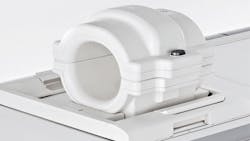Creating a Successful Biotech Company: Innovation, Financing, Location
For Dr. Hiro Fujita, CEO of QED, all of the elements of success lined up. But it wasn't fate that enabled the Cleveland, Ohio- based manufacturer of advanced coils and electronics for magnetic resonance imaging (MRI) machines to become so successful that in 2010 he was invited to meet with President Obama.
The first key element on the path to success was Dr. Fujita's reputation as an expert in the field. He had developed various RF coils for GE, Siemens, Philips, Toshiba and Hitachi while Manager of Research and Development at USA Instruments, Inc. When that company was acquired by GE in 2002 Dr. Fujita became 3 Tesla Engineering Program Manager.
Dr. Fujita then became Director of the Physics MR Imaging Center at Case Western Reserve University (CWRU), based in Cleveland, Ohio, with support from Ohio's Third Frontier program, which is a $2.3 billion economic development initiative that supports innovation and technology to position Ohio for success, with a focus on the biomedical industry.
While at CWRU, Dr. Fujita saw the need for high-performance radio frequency coils in the area of patient diagnosis so he started his work in a 300-square-foot space at Case Western Reserve University. The timing was perfect. GE had bought a company that was already producing coils for MRI machines and other OEMs such as Toshiba and Siemens were not thrilled about using this company as a source given GE was a direct competitor.
So Dr. Fujita, spoke to those companies about backing him as a manufacturers. They liked the idea and agreed to provide seed money so that Dr. Fujita's company would remain independent. Thus the second element of success, financing, was secured. QED was formed in 2006.
QED offers a wide range of state-of-the-art radiofrequency coils; 0.35 Tesla to 3 Telsa RF coils for FDA-approved clinical strength systems and coils up to 11T for research purposes. These advanced coils form an essential part of MRI scanners and translate signals received from patient anatomies into high-quality diagnostic images.
In addition to funding received from potential customers the company has received $4 million in development grants, which includes funding from the SBA's Small Business Innovation Research program.
In July 2007, QED became an ISO-13485 certified company and went on to receive its first 510(k) clearance in November 2007 for a wrist array coil for Toshiba Medical Systems. From there, QED registered with the Japanese Ministry of Health, Labour and Welfare (MHLW) in December 2007 to become a foreign medical device manufacturer permitted to sell its products in Japan.
The third factor in the journey to succes, location, was an easy choice for Dr. Fujita. "We will stay in Cleveland as it is a center of excellence in healthcare. We have world class hospitals such as the Cleveland Clinic and University Hospital as well as educational institutions as well as OEMs such as GE, Philips and Toshiba."
Furthermore his relationship with the State of Ohio has been quite helpful. "We have established a positive relationship so that not only can we ask questions of government agencies, we are, despite the size of our business, quite visible to both state and federal government.
Currently the company employs 130 and revenue has grown 3,500% since 2006, Dr. Fujita told IndustryWeek.
QED has received nationally recognition over the years. In 2009, Forbes magazine designated QED as one of the 20 Most Promising Companies in America (#11). In 2011 QED was named to Inc. Magazine's list of fastest growing companies for the second year in a row. In 2010, Inc. Magazine named Dr. Fujita as one of the top entrepreneurs in America (#4) and placed QED in the Inc 500 (#193). That same year, 2010, Dr. Fujita won the Ernst & Young Entrepreneur of the Year Award. In 2011, QED received the Tibbetts National Award from the U.S. Small Business Administration and NIH, and was invited to The White House for a reception. Dr. Fujita was invited to meet with President Obama in person as a business leader in August 2010 and President Obama's Winning the Future.
However to Dr. Fujita his most important accomplishment is his contribution to society.
"It is most important that you have a vision and culture," he said. "It's one thing to start a business and talk about revenues. But it's more important to create a business based on a philosophy that you are doing the right thing as a human being and making a positive different in a society. This has to be there."
